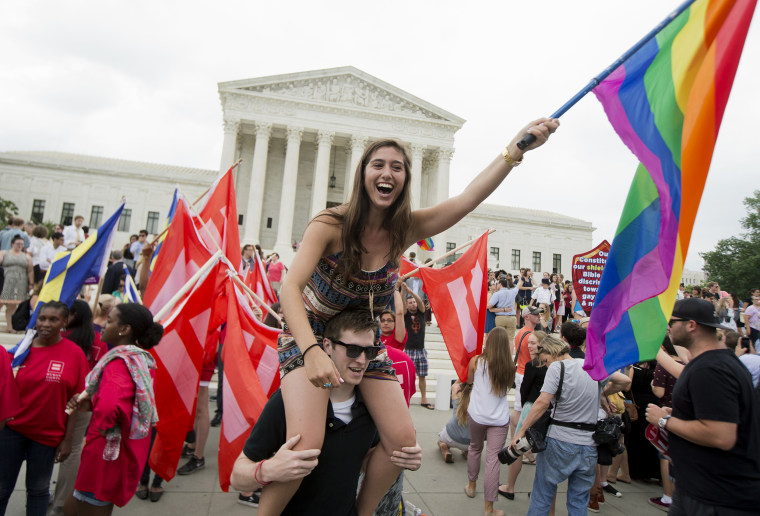A symbol of white supremacy has at last been decisively cast out. Millions of Americans have been spared the threat of losing health insurance, ensuring that the centerpiece of President Obama's legacy remains intact. A landmark civil rights law has been maintained at full strength. And the decades-long struggle for full equality for gays and lesbians has achieved an almost total triumph.
This week will go down as among the best for progressives in recent memory.
RELATED: Obama calls gay marriage ruling a ‘victory of America’
It’s an embarrassment of riches that comes at a time when many progressives had abandoned hope of notching far-reaching wins any time soon, given Republican control of Congress and the approaching twilight of the Obama presidency. And the victories are all the sweeter because they came at the hands of powerful decision-makers who more often have lined up on the other side.
The week began in mourning, as Americans of all political stripes condemned the horrific murders of nine African-Americans by a white supremacist in Charleston, South Carolina. But while other recent gun massacres have prompted urgent calls for policy changes, followed by inaction and a return to the status quo, this time was different. On Monday, South Carolina's Republican governor, Nikki Haley, responding to a powerful campaign that took shape online and off, called for the Confederate flag—to many Americans, not only those who are black, a long-standing symbol of racial hatred—to be removed from the statehouse grounds.
“The fact that it causes pain to so many is enough,” said Haley, who previously had opposed calls to banish the flag. The following day, state lawmakers voted overwhelmingly to begin debating the flag’s removal.
RELATED: Ken Burns: Flag issue is not about heritage
Haley’s speech was the catalyst for a remarkable stampede away from the flag that few could have predicted even a day or two after the shootings put a focus on ongoing racial intolerance. Alabama Gov. Robert Bentley, also a Republican, on Wednesday ordered the flag removed from his state’s capitol grounds, saying: “This is the right thing to do.” Walmart, Amazon, Sears and eBay all said they would stop selling Confederate flag-themed merchandise, as a broad movement to get rid of all remaining symbols of the Confederacy, from Texas to Washington, D.C., and beyond, gained strength.
The following day brought victories of a different kind. Surprising many observers, the Supreme Court ruled against a challenge to the Fair Housing Act in a case that could have massively weakened the landmark civil rights law, which was passed in the wake of Martin Luther King’s death, and bars discrimination in housing.
Minutes later came an even bigger decision: By 6-3, the justices rejected a conservative challenge to Obamacare that could have barred federally run insurance exchanges and thrown the entire insurance system into chaos, threatening access to health care for millions.
For some progressives, almost as sweet as the ruling itself was the way Chief Justice John Roberts dismissed the challenge, which was based in its entirety on an in-artfully worded section of the law. Roberts calmly wrote that, taken in context, the purpose of the law’s drafters to provide for a federal exchange was obvious. That will make it much harder for a future Republican administration to cut off funding for the federal exchange by saying it interprets the law differently.
For many supporters of the president, the ruling had a symbolic resonance to add to its real-world impact. Had Obama’s signature health care law been unraveled, it would have represented the defeat of his most important legislative accomplishment, giving ammunition to critics—mostly on the right, but some on the left—seeking to portray the nation’s first black president as a failure. Instead, he’ll go down, among other things, as the architect of what looks likely to take its place alongside Social Security and Medicare as a core component of the American safety net.
RELATED: Supreme Court ruling strengthens Obama’s legacy
Then on Friday, the capstone: In a ruling that was generally expected but no less powerful for it, the Supreme Court recognized a nationwide right to same-sex marriage. Gay and lesbian couples, wrote Justice Anthony Kennedy, “ask for equal dignity in the eyes of the law. The Constitution grants them that right.”
The decision marked a decisive victory for a cause that in little more than a decade had gone from a sure-fire political loser to achieving a broad consensus of support. And for many progressives, the anguished dissent issued by Justice Antonin Scalia—“I would hide my head in a bag” rather than sign on to the majority opinion, he wrote—offered a schadenfreude-tinged bonus.
Of course, the sense of buoyancy may not last long. Even in the realm of gay rights, the battle is far from over—it’ll now shift to a focus on making sure gays and lesbians can’t be fired for being who they are. Elsewhere, the hard, slow work of politics will continue for progressives: keeping up the pressure on curbing climate change, pushing for measures to combat growing economic inequality and ensuring the White House stays in friendly hands come 2017. And this weekend will bring a sense of somberness, as Clementa Pinckney, the South Carolina pastor and state senator killed last week, is laid to rest along with several other victims of the shooting.
But for now, at least, it seems possible to believe that, despite staunch opposition, America is on a path to overcoming centuries of prejudice and discrimination, and ensuring that even those who are struggling have access to an essential human right. And that's worth celebrating.
